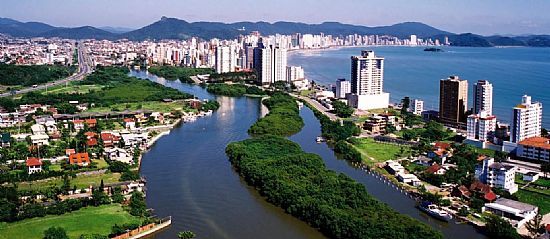
Uploaded on 2017-04-12 by Suelen Artuso
Ecosystems offer different services to humans, such as provisioning, regulation, habitat or support, and cultural. In the city of Balneário Camboriú, Brazil, we can find all these services as follows: Provisioning Service: describes the material or energy produced from the ecosystem, such as food, water, wood and fiber. These are the services that guarantee access to the goods and resources and nutrition for the population. The city of Balneário Camboriú has a small area of land, approximately 46 square kilometers, which makes it essentially urban, with few rural areas. In these rural areas there is the predominant production of rice, and the other foods come from nearby cities. Another important source of food and also important for the economy is fishing and seafood production, as this is a coastal area. The water comes from the rivers, mainly the Camboriú River and the Itajaiaçú River, which are the providers for the potable water distribution system for the city. Regulating service: These are services that act as regulators of the ecosystem, affecting the climate, floods, diseases, waste, water and air quality, erosion and pollination. They guarantee access to the goods, health and safety of the residents. The forest on the hills near the city (Atlantic Forest) and the rivers that reach the beach, and the ocean are the natural regulators of temperature, air quality and pollination, but this is not happening in the city center. The center of the city is almost totally impermeable due to the asphalt a and the occupancy rate of the buildings, which makes the drainage of rainwater precarious, causing great floods in the time of the greatest rains in late spring and early summer. Habitat or supporting services are primary productions that support other services, are responsible for soil formation, photosynthesis and nutrient cycling. Some examples are the rivers, the sandy soil and the existing vegetation (the Atlantic Forest in the areas of persistence of the hills and vegetation of restinda in the littoral in some districts of the municipality). As a form of protection of these essential services, the Water Producer Project aims at the recovery of permanent preservation areas on the banks of the Camboriú River, benefiting farmers and consequently increasing water levels for the municipality - intends to recover 180 hectares of riparian forest, Besides avoiding the withdrawal of the water to irrigate crops of rice. Cultural services: provide recreational, aesthetic and spiritual benefits, ensuring the well-being of the population. Besides the coast that has an aesthetic value and undisputed recreation, ecotourism is also important for the municipality. In the hills of the city (Morro do Careca and Parque Interpraias) there are trails, gazebos and cable cars to attract tourism. In addition, nearby there are other hills and places where you can find waterfalls and trails that are very frequented, attracting mainly a public focused on the practice of meditation with nature, climbing, and trekking.